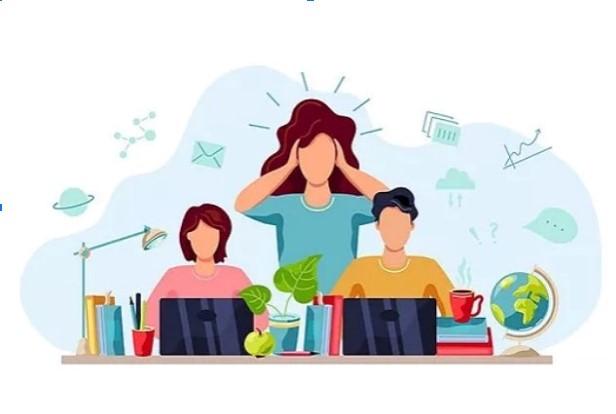Editors Note: The California Partners Project conducted a statewide listening tour with California mothers, parents, and caregivers to understand how they navigated the integration of technology and devices into most aspects of their children’s lives. These evolving toolkits and best practices are meant to meet parents where they are. Managing Parental Guilt is the twelfth toolkit.
Guilt can motivate us to work toward change, but shame can get us stuck comparing ourselves to others. According to psychologist Lindsay Malloy, co-founder of Pandemic Parenting, some guilt can help us reflect on our previous actions to make future positive change. However, shame can get in the way of our ability to adapt and improve. During a time of relentless parenting, it is important to stay focused on what you can improve, and what was and is necessary to get through difficult situations.
Parents, especially mothers, experienced more stress during the pandemic. A Stress in America survey by the American Psychological Association, showed that nearly half of mothers (47%) with children doing remote learning at home reported their mental health worsened. Family life changed in unimaginable ways.
Tips to manage parental guilt and let go of shame
Tip 1: Accept that you made the best choices available based on the individual circumstances of your own family.
Pediatrician and child health advocate Dr. Jackie Douge advises parents to recognize that they had to make tough choices to balance the needs of the entire family during a difficult time. Every family faced their own hardships and had to adjust based on those realities.
Tip 2: Acknowledge that some rules were suspended during a hard year.
Vicki Harrison, MSW and Program Director at the Center for Youth Mental Health and Wellbeing at Stanford University School of Medicine, recommends parents recognize that the last year was difficult and some unintended habits that got us through won’t continue as we recalibrate to a new and shifting reality.
Tip 3: Consider the ways in which you and your family have grown.
The experiences of the past year have changed everyone. Mindfully take the positive developments forward. Kids are resilient and we have all developed a set of skills that will serve us better for the next challenge we face.
Tip 4: Practice self-care that is meaningful to you.
Self-care can be as simple as a special, daily cup of coffee or an extra ten minutes you set aside to connect with a friend. Find specific, tangible ways to support yourself and alleviate burnout. Self-Care in the Time of Coronavirus – Child Mind Institute
Resources

















